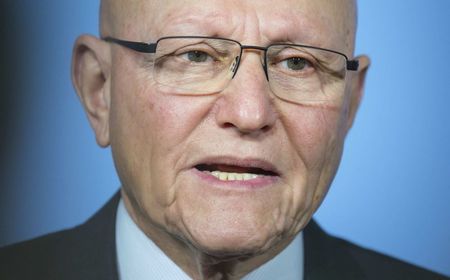By Richard Mably and Samia Nakhoul
BEIRUT (Reuters) - Lebanese Prime Minister Tammam Salam believes a deal settling the Iranian nuclear dispute could help pave the way towards ending the political deadlock that has left his country without a president since May.
The Mediterranean country of about 4 million has been hit hard by the war in its much larger neighbour Syria, with violence spilling across the border and threatening the fragile sectarian balance that has largely held since Lebanon's own 1975-90 civil war.
Lebanese politics - long seen as some of the Arab world's most democratic, despite their flaws - have largely ground to a halt as a result of tensions stoked by the Syrian conflict.
Lebanon has had no president since May because lawmakers divided between Shi'ite Muslim and Sunni-led blocs have been unable to agree on a replacement. This month parliament voted to extend its own term into 2017, forgoing scheduled elections.
Salam said resolving Lebanon's crisis would first require defusing regional tensions, possibly starting with a deal around Iran's nuclear programme, followed by an eventual resolution of Syria's war.
"Everything is connected. If we are looking towards a solution for our presidency situation in Lebanon, we would also be looking for other solutions for the whole region," he said in an interview at the government headquarters in Beirut. "At the moment, unfortunately, there is nothing in light yet."
Western and Iranian officials held talks this week in Oman, with a deadline for reaching a nuclear deal less than two weeks away. No imminent breakthrough is in sight.
Lebanon can ill afford a long wait. Tourism and investment have fallen since the Syrian crisis erupted in 2011, while the political stalemate has hampered efforts tackle the substantial public debt, exploit potential off-shore gas reserves and improve shoddy infrastructure.
"I have to admit the government is working at half steam," Salam said, urging politicians to elect a new president quickly. "Nobody can say a body without a head is a complete body, so, yes, we need a head for this country."
VIOLENCE MAY CONTINUE
Syria-linked violence has also encroached on Lebanon, with gun battles, car bombings and rocket attacks killing hundreds of people. Islamist gunmen have fought the army in two big battles since August.
Salam, who is Sunni as required by Lebanon's constitution, said it was unclear how many Sunni militants were in the country but said attacks could continue.
He also acknowledged the extent of outside influence over Lebanon, saying it had only once freely chosen a president without foreign interference since independence in 1943.
Salam's own government was formed in February after nearly a year of deadlock was ended by what was widely seen as a deal between Iran and Saudi Arabia, two regional backers of Lebanon's political factions.
The divide between those factions, one led by the Shi'ite Hezbollah and the other by Sunni leader Saad al-Hariri, is still wide. Both sides accuse the other of dragging the country further into Syria's crisis.
Hezbollah has sent fighters to aid Syrian President Bashar al-Assad against mostly Sunni rebels, while Sunni militants have increasingly clashed with the army.

"The struggle goes on," Salam said. "From the start I never claimed that we are going to fly high. I said we will try to avoid falling down, try to avoid the negative impact of what is happening regionally. It is not an easy thing happening."
(Additional reporting by Tom Perry and Laila Bassam; Writing by Alexander Dziadosz; Editing by Dominic Evans)
